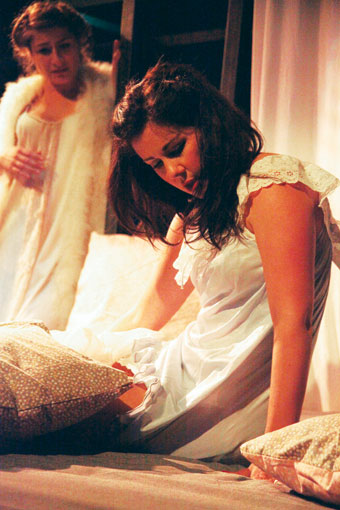Next story: Tru
A Streetcar Named Desire
by Anthony Chase

Tennessee Williams’s 1947 play, A Streetcar Named Desire, is somewhat of a sacred text in the American theater. Each of the characters is a coveted rite of passage for any actor who is lucky enough to be cast.
Streetcar is the story of Blanche DuBois, whose life began a decline after the suicide of her young gay husband. That slide to oblivion continued as her family wealth was frittered away and she began to lose her emotional grip. As the play begins, Blanche has been fired from her teaching position in Laurel, Mississippi—unfit to be near young people. She has arrived at the humble flat in the French Quarter of New Orleans where her sister, Stella, lives with her crude husband, Stanley.
Her life will not improve.
The announcement of the Torn Space cast for Streetcar was something between intriguing and perflexing. To begin, there would only be four actors in a play that “requires” a dozen. Next, only Kristin Bentley as Stella seemed remotely appropriate for the part.
Tilke Hill as Blanche? Not vulnerable in any way.

Stan Klimecko as Stanley? Too mature, and lacking in the animal magnetism of a Marlon Brando, the Stanley against which all Stanleys are inevitably judged.
Christian Brandjes as Mitch? Rather small and refined for the role, but possible.
But wow!
Throw those preconceived notions out the window. Director Dan Shanahan has manhandled this sacred text, streamlining and amplifying, to provide an evening that packs a powerful wallop!
To begin, the production is entirely about Blanche, and Tilke Hill is mesmerizing. She’s played out and she’s desperate, but it is circumstance that has made her vulnerable, not inner weakness. By presenting supporting players as video projections, Shanahan places the focus firmly on Hill who plays certain unforgettable scenes as monologues.
For instance, “Young man. Young young young young man. Has anyone ever told you that you look like a young prince out of the Arabian Knights” is played squarely to the audience. It’s commanding. So is Blanche’s reversal as she sends the boy away, revealing that she must keep her hands off of children.
Hill has numerous moments of new insight. One of the most startling is her exit announcement that she “always depending on the kindness of strangers.” This is always played as a pathetic surrender to madness. Hill hurls it out as an accusation at Stella, the sister to whom she came for help. The moment is magnificent.
Stan Klimecko’s Stanley is devoid of the charisma we have learned to associate with the character. Charismatic Stanley is the husband to whom Stella is drawn with animal-like attraction. Instead, Klimecko lets us see the Stanley that Blanche sees. He’s cruel. He’s violent. He’s a rapist. He is her enemy and nemesis. And this terrifying interpretation is entirely supported by Williams’s script.
Christian Brandjes gives a traditional and entirely satisfying performance as Mitch. In this production Kristin Bentley’s Stella seems more personally vulnerable and more disconnected from reality than Blanche, as if to suggest that Blanche’s fatal mistake was to fight.
There is no attempt at realism here. Video designer Brian Milbrand, graphic designer Tim Stegner, and set designer Kristina Siegel provide an entirely abstracted and rather industrial space. The room to which Blanche is relegated in the claustrophobic apartment is literally a small place in which to stand. Blanche’s increasing sense of entrapment is underscored by abusive projections on the back wall. Similar moments are punctuated in other ways, for instance when Blanche suppresses her sexuality in order to convince Mitch that she’s a lady, and the doll he wins for her at a carnival is, ironically, that icon of libido, Mae West. The world betrays Blanche at every turn.
Without question, this is no production for the purist. On the other hand, Torn Space is not typically a destination for purists. This production of Streetcar is powerful, like none you have ever seen, and in its own entirely original way, wonderful.
A Streetcar Named Desire continues at The Adam Mickiewicz Dramatic Circle through October 7.
|
Issue Navigation> Issue Index > v11n40 (Week of Thursday, October 4) > Theater Week > A Streetcar Named Desire This Week's Issue • Artvoice Daily • Artvoice TV • Events Calendar • Classifieds |









 Current Issue
Current Issue